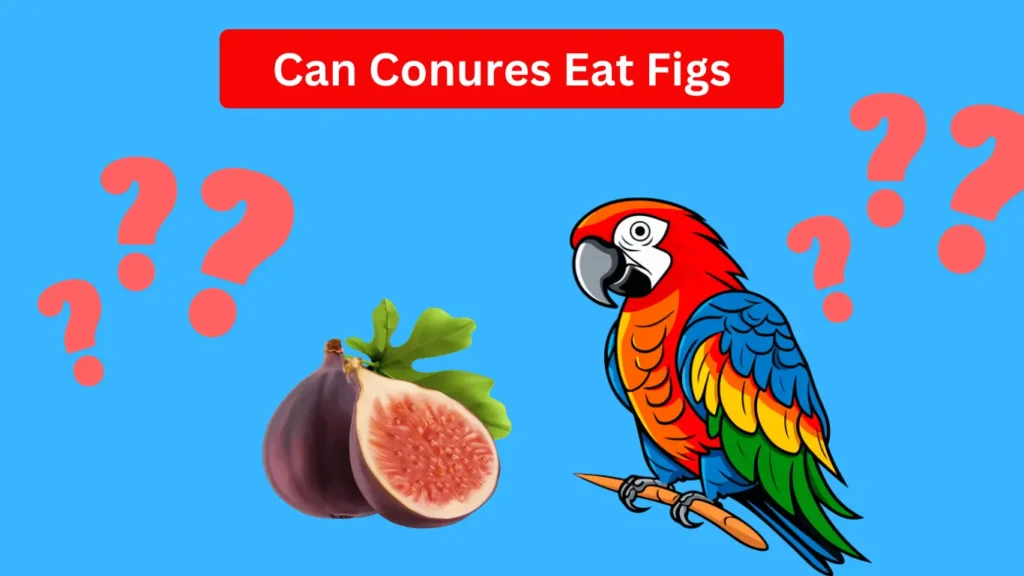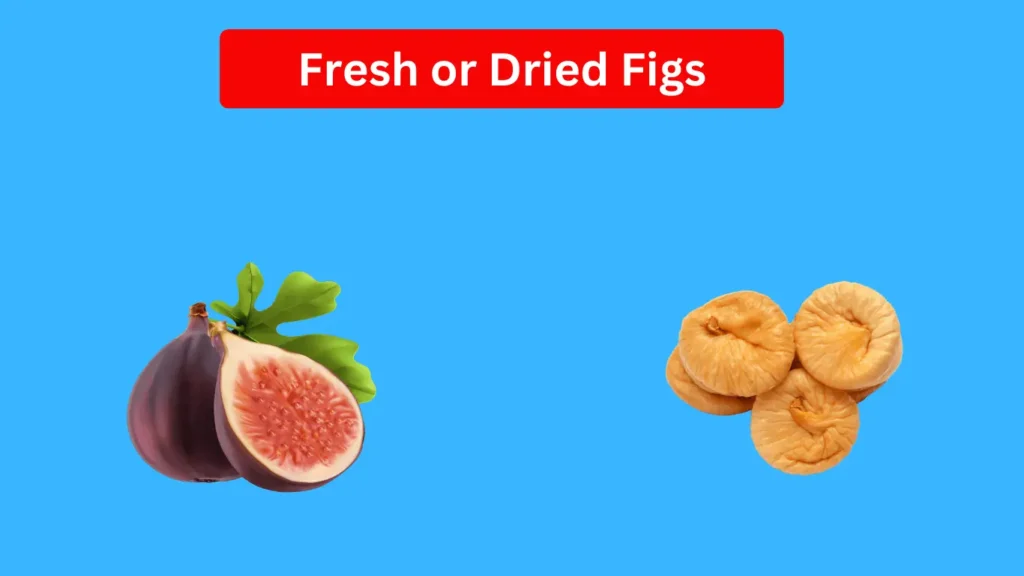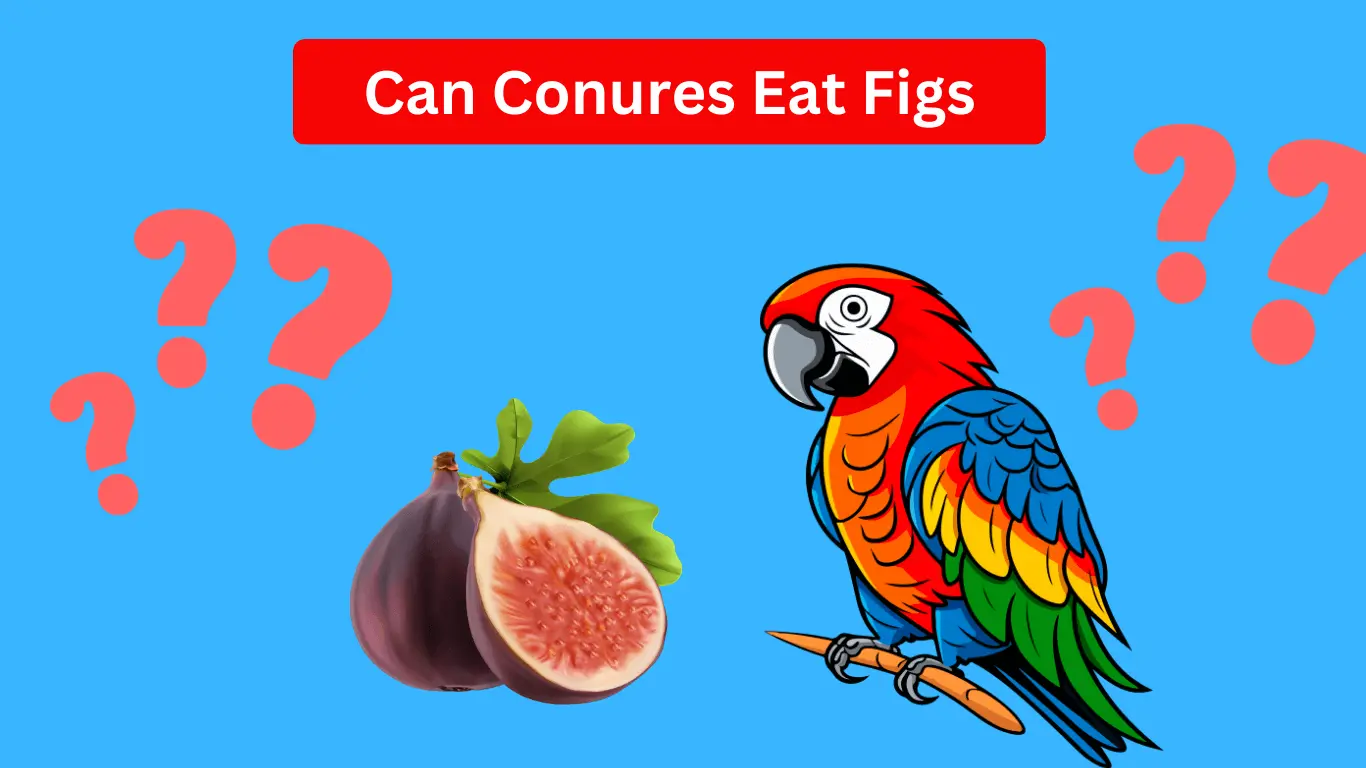Can conures eat figs? Find out the nutritional value of figs, and how to safely add them to your bird’s diet in our detailed. Yes, Conures can eat figs! Figs are a type of fruit that can also be given to a Conure but in limited amounts. Figs are rich in vitamins and minerals, I believe that figs will do your bird a lot of favors.

Table of Contents
Health Benefits of Figs for Conures
Rich in Dietary Fiber
Figs are regarded as tasty and healthy food as they contain much fiber that should be necessary for the digestive processes. Fiber plays a role in controlling bowel movement hence reduces constipation and makes the gut healthy. It also prevents body weight gain because it acts as an appetite suppressor to discourage instances of overeating.
High in Antioxidants
Figs are well endowed with antioxidants, particularly polyphenol content. Some of these compounds aid in offsetting free radicals, hence reducing the danger of oxidative stress. It can prevent the occurrence of several diseases with time including heart disease, cancer, and diabetes. Dried figs are especially high in antioxidants; that means snacking on them will give your body a good fighting chance.
Excellent Source of Potassium
It appears that potassium is an essential mineral that impacts blood pressure levels. Figs are rich in potassium and that counteracts the impacts of sodium in nourishment, hence, decreasing hypertension. It can benefit the heart by making people avoid hypertension issues in addition to reducing the probability of a stroke.
Packed with Calcium
Calcium is important for the good health of bones and teeth, and figs include a high percentage of this component. It was identified that it is possible to add figs to increase bone stock and thereby decrease the likelihood of occurrence of osteoporosis as one age.
Good Source of Vitamins
Figs contain several important vitamins, including:

- Vitamin A: Beneficial for better eye and skin health and has a positive effect on the immune system.
- Vitamin K: Concerns with blood clotting and with the strengthening of bones.
- Vitamin C: Strengthen the body’s defense mechanism and enhance the formation of collagen, a crucial protein for skin care.
Contains Natural Sugars for Quick Energy
Figs are incompressible naturally sweet because they contain natural sugars such as glucose and fructose. Due to this, they come in handy for a quick supply of energy, this is for whoever maybe engaging in physical activities or whoever may need a quick supply of energy. Nevertheless, they should be consumed in moderate proportion because they contain high levels of sugars notably dried figs.
Supports Heart Health
Besides potassium, figs contain magnesium and edible fiber that is good for the heart. Figs are high in fiber which reduces the LDL cholesterol (the “wrong” kind of cholesterol) in the body to help fight heart diseases. Besides, the presence of potassium in figs assists in the stability of blood pressure creating overall improved heart health.
Promotes Healthy Skin
Antioxidants like flavonoids, along with vitamins C and E determined for great contributions to skin welfare. These nutrients can prevent the ill effects of aging, lessen the lines on the face, and keep the skin glowing.
Blood Sugar Control
Despite being sweet fruits with sugar content, figs have fiber content that reduces the rate at which sugar enters the bloodstream leaving out high or steep blood sugar rates. Doing this makes figs a good option for liberalization for those with diabetes when taken in moderate proportions. That being said, dried figs are much higher in sugar so they should not be consumed in great amounts.
Good for Weight Management
Figs are low in fat while very rich in fiber and as we know fiber has an appetite-suppressing effect in the body. This can help cut out some of the chances of taking snacks that are moist which are so dangerous to the health of an individual since they help in controlling the issue of overweight. And while figs are high in sugars, they can be a wholesome weight management diet when taken in moderation.
Contains Essential Minerals
Besides calcium and potassium, figs also contain other useful minerals such as magnesium, iron, and copper. These are important in the body in as far as they are used in generating energy, muscle contraction, and oxygen transport in the blood respectively.
Anti-Inflammatory Properties
Diosgenin present in figs has been shown to exhibit anti-inflammatory properties. They may also lower the inflammation levels in the body which is an inflammatory marker for most chronic diseases such as arthritis, and heart disease among others.
Are Figs Safe for Conures?
Figs are not toxic to birds but they should not be fed on in large quantities or raw. Generally, it is better to buy fresh figs to eat them because they contain more water and thus require less work from the stomach. Figs should also be given to birds clean and should be chopped into small pieces before feeding them to your bird.
How Often Should You Feed Figs to Your Conure?
Figs contain natural sugars and should not be taken in large proportions because they can be dangerous to your parrot’s health. Consequently, they are best allowed as a supplement every once in a while rather than something to nibble on every day. So if your bird wants to eat a small piece of fig a few times a week it will be great otherwise, it will be overloaded with sugar.
Choosing the Right Type of Figs
Fresh vs. Dried Figs

When choosing the figs to be fed to your Conure, therefore, fresh figs are generally preferable. These have a higher moisture content than the dried figs and are less concentrated sources of sugar, therefore they are easily digestible by birds. For this reason, dried figs contain more sugar and they too should not be given or only occasionally.
Organic Figs
When sourcing for figs always opt for organic ones to minimize the chemicals your Conure will be exposed to. Pesticide especially affects the liver of birds and therefore the figs to be used must be cleaned and free from pesticide.
How to Serve Figs to Your Conure
It is important that before feeding your Conure with figs, you have to wash them first to eliminate any extraneous materials like dirt, pesticide, etc remaining on the skin. One can raise them by steeping them for a few minutes in water and then washing them in running water.
After washing the fig, chop it into small pieces that your bird will be able to handle as well as pick and ingest. It will also prevent choking particularly where your Conure is small or not accustomed to large items of food.
The fig seeds are tiny and tender, which does not make them a choking hazard to Conure and other birds. Here, you don’t use any cover because they are not a choking hazard. However, if your bird seems to dislike the seeds, you can take them off before preparing the recipe or give them with other fruits.
Conclusion
In Conclusion, Figs are a healthy diet for any type of parrot like Amazon parrots, African gray, budgies, cockatiels, cockatoos, and sun conures. However, to believe that fresh figs contain vitamins and minerals that are useful for your bird’s health, especially fresh figs. As long as the sugar intake is controlled and the consumption of figs is not excessive they can be a great snack.
FAQs
Can parrots eat dried figs?
Yes, Parrots can safely eat dried figs but always give them in moderation amounts.
Can conures eat figs every day?
Figs are good for parrots but it is not a good idea to give them daily Giving them once time in a week is safe for health.
Can parrots eat figs seeds?
Parrots can eat fig seeds safely because their seeds are tiny and soft which is not dangerous for birds.
Are Figs good for your lovely birds?
Figs are okay for your lovely birds because they are rich in fibers, minerals, and vitamins but given in limited amounts.
Related Posts
- Can Parrots eat Pomegranates?
- Can Parrots eat Plums?
- Can Parrots Eat Peaches?
- Can Parrots Eat Cherries?

Abubakr is a passionate parrot enthusiast based in Pakistan. He shares his life with his vibrant parrot, Peto, and is dedicated to understanding parrot nutrition, behavior, and training. Through his experiences with Peto, Abubakr aims to gain a deeper insight into the needs and personalities of parrots and to share his knowledge with fellow parrot lovers. With a focus on the nutrition of conures, Abubakr is excited to connect with like-minded individuals and learn from their experiences.
